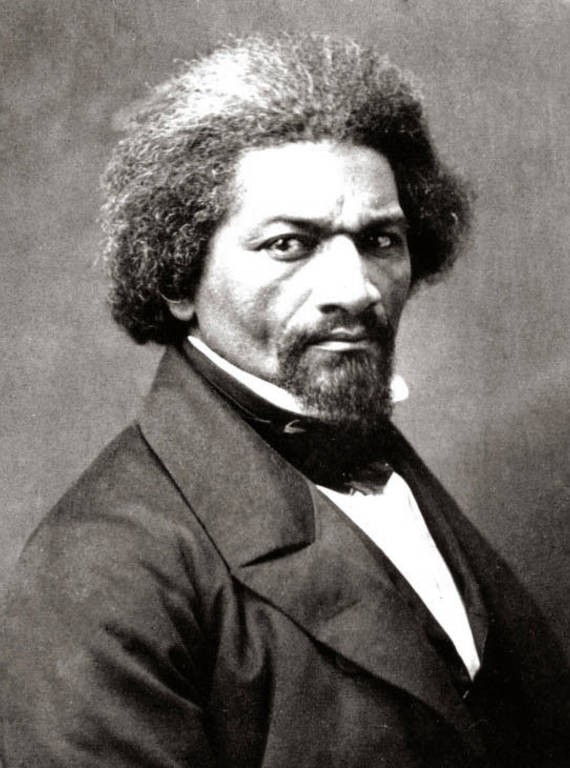Are you curious about why Frederick Douglass was important in American history? Frederick Douglass’s significance lies in his relentless fight against slavery and his powerful advocacy for equality, making him a pivotal figure in the abolitionist movement and a champion of human rights. Explore his journey from enslaved person to influential statesman, and understand his lasting impact on American society, civil rights advocacy, and social justice, further explored at WHY.EDU.VN. Discover the profound influence of his writings, speeches, and activism, and gain a deeper appreciation for his contributions to the ongoing struggle for equality and justice.
1. Understanding Frederick Douglass’s Early Life and Escape from Slavery
1.1. The Harsh Realities of Douglass’s Enslaved Beginnings
Born into slavery around 1818 in Talbot County, Maryland, Frederick Augustus Washington Bailey, later known as Frederick Douglass, faced unimaginable hardships from a young age. Separated from his mother, Harriet Bailey, shortly after birth, he experienced the brutal realities of slavery firsthand. Douglass was subjected to physical and emotional abuse, witnessing and enduring the cruelty inflicted upon enslaved people. This early exposure to the dehumanizing aspects of slavery fueled his determination to escape and fight for freedom.
| Aspect of Early Life | Description | Impact |
|---|---|---|
| Birth and Parentage | Born into slavery, separated from his mother early on. | Created a sense of longing and a desire to understand his origins. |
| Treatment | Witnessed and experienced physical and emotional abuse. | Fueled his determination to escape and fight against slavery. |
| Education | Secretly learned to read and write, defying the laws prohibiting enslaved people from education. | Opened his mind to new ideas, empowering him to articulate his thoughts and beliefs. |


1.2. Douglass’s Quest for Knowledge and Self-Education
Despite the oppressive environment, Douglass developed an insatiable thirst for knowledge. He secretly taught himself to read and write, defying the laws that prohibited enslaved people from receiving an education. This self-education opened his mind to new ideas and empowered him to articulate his thoughts and beliefs. Douglass recognized the transformative power of education as a means of liberation and self-empowerment, which further solidified his commitment to the abolitionist cause.
1.3. The Daring Escape to Freedom in 1838
In 1838, at the age of 20, Douglass made a daring escape from slavery. With the help of Anna Murray, a free Black woman who later became his wife, he fled to New York City, using borrowed identification papers and disguises to evade capture. This successful escape marked a turning point in Douglass’s life, as he embraced his newfound freedom and dedicated himself to the fight against slavery. His personal experience as a formerly enslaved person gave him credibility and a unique perspective, making him a powerful voice in the abolitionist movement.
2. Douglass’s Emergence as a Prominent Abolitionist and Orator
2.1. Douglass’s Powerful Voice in the Abolitionist Movement
After escaping slavery, Frederick Douglass quickly became a prominent figure in the abolitionist movement. His powerful speeches and writings vividly depicted the horrors of slavery and passionately advocated for its abolition. Douglass joined the Massachusetts Anti-Slavery Society and traveled extensively, sharing his personal experiences and challenging the moral foundations of slavery. His eloquence and compelling arguments captivated audiences, making him one of the most influential voices in the fight against slavery.
2.2. The Publication of “Narrative of the Life of Frederick Douglass, an American Slave” (1845)
In 1845, Douglass published his first autobiography, “Narrative of the Life of Frederick Douglass, an American Slave.” This groundbreaking work provided a firsthand account of his life as an enslaved person, detailing the physical and psychological trauma he endured. The narrative became an instant bestseller, exposing the brutal realities of slavery to a wide audience. It also challenged the prevailing stereotypes about enslaved people and affirmed their humanity and intellectual capacity. The book solidified Douglass’s reputation as a leading abolitionist and a powerful literary voice.
2.3. Founding and Publishing The North Star Newspaper
Douglass’s commitment to abolitionism led him to found his own newspaper, The North Star, in 1847. Named after the star that guided enslaved people to freedom, the newspaper served as a platform for Douglass to express his views on slavery, racial equality, and other social justice issues. The North Star provided a voice for the marginalized and oppressed, advocating for the rights of African Americans and promoting the abolitionist cause. Through his newspaper, Douglass reached a wider audience and played a crucial role in shaping public opinion on slavery.
3. Douglass’s Advocacy for Civil Rights and Equality
3.1. Douglass’s Vision for a Racially Just Society
Frederick Douglass’s vision extended beyond the abolition of slavery. He advocated for full civil rights and equality for all African Americans, including the right to vote, access to education, and equal opportunities in employment and housing. Douglass believed that true freedom required not only the absence of slavery but also the dismantling of systemic racism and discrimination. He challenged the prevailing racial prejudices and fought for a society where all individuals were treated with dignity and respect, regardless of their race.
3.2. Supporting Women’s Rights and Suffrage
Douglass was a staunch supporter of women’s rights and suffrage, recognizing the parallels between the struggles for racial and gender equality. He attended the Seneca Falls Convention in 1848, the first women’s rights convention, and spoke passionately in favor of women’s right to vote. Douglass believed that both African Americans and women were denied their fundamental rights and deserved equal treatment under the law. He collaborated with prominent women’s rights activists, such as Elizabeth Cady Stanton and Susan B. Anthony, to advance the cause of women’s suffrage.
3.3. Douglass’s Role During the Civil War and Reconstruction
During the Civil War, Douglass played a crucial role in advocating for the emancipation of enslaved people and the enlistment of African American soldiers in the Union Army. He met with President Abraham Lincoln to urge him to issue the Emancipation Proclamation and to ensure that African American soldiers received equal pay and treatment. After the war, Douglass continued to fight for civil rights during the Reconstruction era, advocating for the passage of constitutional amendments that guaranteed equal protection under the law and the right to vote for African American men.
4. Douglass’s International Influence and Diplomatic Service
4.1. Douglass’s Travels and Speaking Engagements in Europe
Frederick Douglass’s influence extended beyond the borders of the United States. He traveled to Europe on several occasions, delivering speeches and lectures on the evils of slavery and the importance of human rights. Douglass’s eloquence and personal story captivated audiences in Great Britain, Ireland, and other European countries. He gained international support for the abolitionist cause and helped to raise awareness about the injustices of slavery.
| Location | Purpose | Outcome |
|---|---|---|
| Britain | Speaking tour to advocate against slavery. | Raised funds to purchase his freedom and gained international support for the abolitionist cause. |
| Ireland | Speaking tour to advocate against slavery. | Inspired audiences with his eloquence and personal story, raising awareness about the injustices of slavery. |
4.2. Serving as U.S. Minister to Haiti and Chargé d’Affaires to Santo Domingo
In recognition of his diplomatic skills and commitment to human rights, Douglass was appointed as the U.S. Minister to Haiti in 1889. He later served as Chargé d’Affaires to Santo Domingo. In these roles, Douglass represented the United States government and worked to promote diplomatic relations and trade between the two countries. He also used his position to advocate for the rights of African Americans and to challenge racial prejudice in international affairs.
4.3. Douglass’s Legacy as an International Statesman
Douglass’s diplomatic service solidified his legacy as an international statesman. He demonstrated that African Americans were capable of representing their country on the world stage and contributing to global affairs. His work in Haiti and Santo Domingo helped to strengthen relations between the United States and these nations. Douglass’s commitment to human rights and equality made him a respected figure in international circles and a symbol of hope for oppressed people around the world.
5. Exploring the Enduring Relevance of Douglass’s Ideas and Activism
5.1. Douglass’s Writings and Speeches as Sources of Inspiration
Frederick Douglass’s writings and speeches continue to inspire and resonate with readers and listeners today. His autobiographies, essays, and orations offer profound insights into the human condition, the nature of freedom, and the struggle for justice. Douglass’s words challenge us to confront the injustices in our own societies and to work towards a more equitable and inclusive world. His writings are studied in schools and universities, and his speeches are quoted by activists and leaders around the world.
5.2. Douglass’s Influence on the Civil Rights Movement and Beyond
Douglass’s legacy had a profound influence on the Civil Rights Movement of the 20th century and continues to shape the struggle for social justice today. Civil rights leaders, such as Martin Luther King Jr., drew inspiration from Douglass’s writings and speeches, adopting his nonviolent approach to protest and his unwavering commitment to equality. Douglass’s ideas about racial justice, equality, and human rights remain relevant in the 21st century, as we grapple with issues such as systemic racism, police brutality, and economic inequality.
5.3. Commemorating Douglass’s Life and Achievements at the Frederick Douglass National Historic Site
The Frederick Douglass National Historic Site in Washington, D.C., preserves Douglass’s final home, Cedar Hill, and serves as a museum and educational center dedicated to his life and achievements. Visitors can tour the house, view exhibits, and learn about Douglass’s work as an abolitionist, civil rights activist, and statesman. The site also hosts educational programs and events that promote Douglass’s legacy and encourage visitors to reflect on the ongoing struggle for equality and justice.
6. Examining Douglass’s Complex Relationship with Abraham Lincoln
6.1. Initial Disagreements and Criticisms of Lincoln’s Policies
Frederick Douglass’s relationship with Abraham Lincoln was complex and evolved over time. Initially, Douglass criticized Lincoln’s policies on slavery, arguing that they did not go far enough in advocating for emancipation and equal rights for African Americans. Douglass believed that Lincoln was too cautious and pragmatic, prioritizing the preservation of the Union over the abolition of slavery. He publicly challenged Lincoln to take a stronger stance against slavery and to recognize the humanity and rights of African Americans.
6.2. Douglass’s Growing Respect for Lincoln’s Leadership During the Civil War
As the Civil War progressed, Douglass’s opinion of Lincoln began to change. He recognized Lincoln’s growing commitment to emancipation and his willingness to use the war as a means to end slavery. Douglass was particularly impressed by Lincoln’s decision to issue the Emancipation Proclamation in 1863, which declared the freedom of enslaved people in Confederate territories. He also applauded Lincoln’s efforts to recruit African American soldiers into the Union Army, giving them the opportunity to fight for their own liberation.
6.3. Douglass’s Eulogy for Lincoln and Recognition of His Historical Significance
After Lincoln’s assassination in 1865, Douglass delivered a powerful eulogy in which he acknowledged Lincoln’s historical significance and his role in ending slavery. Douglass recognized that Lincoln, despite his initial hesitations, had ultimately embraced the cause of emancipation and had become a symbol of hope for African Americans. Douglass’s eulogy reflected his evolving understanding of Lincoln’s leadership and his recognition of the president’s contributions to the struggle for racial justice.
7. Douglass’s Views on Education and Self-Improvement
7.1. The Importance of Education as a Tool for Liberation
Frederick Douglass believed that education was essential for the liberation and empowerment of African Americans. He argued that education provided individuals with the knowledge, skills, and critical thinking abilities necessary to challenge oppression and achieve social and economic advancement. Douglass himself was a self-educated man, having taught himself to read and write despite the laws that prohibited enslaved people from receiving an education. He saw education as a means of breaking the chains of slavery and creating a more just and equitable society.
7.2. Promoting Vocational Training and Economic Independence
In addition to advocating for formal education, Douglass also emphasized the importance of vocational training and economic independence for African Americans. He believed that African Americans needed to acquire marketable skills and establish their own businesses in order to achieve financial security and self-sufficiency. Douglass supported the establishment of trade schools and vocational training programs that would provide African Americans with the skills necessary to compete in the workforce.
7.3. Douglass’s Advocacy for Lifelong Learning and Personal Growth
Douglass was a strong advocate for lifelong learning and personal growth. He believed that individuals should never stop seeking knowledge and striving to improve themselves. Douglass himself was a voracious reader and a lifelong learner, constantly seeking to expand his understanding of the world. He encouraged others to embrace intellectual curiosity and to pursue their passions and interests. Douglass’s commitment to lifelong learning and personal growth serves as an inspiration to people of all ages and backgrounds.
8. Exploring Douglass’s Evolving Views on Racial Integration and Black Nationalism
8.1. Early Advocacy for Racial Integration and Assimilation
In his early years as an abolitionist, Frederick Douglass advocated for racial integration and assimilation. He believed that African Americans should be fully integrated into American society and should have the same rights and opportunities as white citizens. Douglass argued that racial prejudice was based on ignorance and that through education and interaction, white Americans could overcome their biases and accept African Americans as equals.
8.2. Growing Disillusionment with Integration and Consideration of Black Nationalism
Over time, Douglass became increasingly disillusioned with the prospects of racial integration in the United States. He witnessed the persistence of racial discrimination and violence, even after the abolition of slavery. Douglass began to consider alternative strategies, including black nationalism, which emphasized the importance of self-reliance, racial pride, and the establishment of separate black communities.
8.3. Reaffirming Faith in Integration While Acknowledging the Need for Black Empowerment
Despite his flirtation with black nationalism, Douglass ultimately reaffirmed his faith in integration as the ultimate goal. However, he also recognized the need for African Americans to empower themselves and to build their own institutions and communities. Douglass believed that African Americans should work to achieve both integration and self-determination, creating a society where they could be both equal and autonomous.
9. Analyzing Douglass’s Complex Personality and Personal Life
9.1. Balancing Public Activism with Personal Responsibilities
Frederick Douglass was a complex and multifaceted individual who juggled his public activism with his personal responsibilities as a husband and father. He was deeply committed to his family and worked hard to provide for them, even as he traveled extensively and dedicated his time to the abolitionist cause. Douglass faced numerous challenges in balancing his public and private lives, but he remained devoted to both his family and his cause.
9.2. Relationships with Family Members and Fellow Activists
Douglass had close relationships with his family members and fellow activists. He was particularly close to his wife, Anna Murray Douglass, who provided him with unwavering support and encouragement throughout his career. Douglass also had strong bonds with his children, who shared his commitment to social justice. He maintained close friendships with other abolitionists, such as William Lloyd Garrison and Gerrit Smith, who provided him with intellectual and moral support.
9.3. Dealing with Personal Loss and Adversity
Douglass experienced personal loss and adversity throughout his life. He lost several family members to illness and death, including his first wife, Anna Murray Douglass, in 1882. He also faced racial discrimination and violence, which took a toll on his physical and emotional health. Despite these challenges, Douglass remained resilient and determined to continue his fight for justice.
10. Understanding the Criticisms and Controversies Surrounding Douglass’s Legacy
10.1. Accusations of Elitism and Separation from the Black Community
Despite his widespread admiration, Douglass has also faced criticisms and controversies. Some critics have accused him of elitism and of separating himself from the black community. They argue that Douglass’s success and fame led him to become disconnected from the struggles of ordinary African Americans.
10.2. Debates over His Views on Racial Integration and Black Nationalism
Douglass’s views on racial integration and black nationalism have also been the subject of debate. Some critics argue that his early advocacy for integration was naive and that he should have embraced black nationalism more fully. Others argue that his ultimate reaffirmation of integration was the correct path and that black nationalism is a divisive and counterproductive ideology.
10.3. Evaluating Douglass’s Legacy in Light of Contemporary Social Justice Issues
Despite these criticisms, Douglass remains a towering figure in American history and a symbol of hope and inspiration for people around the world. His legacy continues to be debated and reevaluated in light of contemporary social justice issues. As we grapple with issues such as systemic racism, police brutality, and economic inequality, Douglass’s words and example offer valuable insights and guidance.
Frederick Douglass’s importance is undeniable. His life story, from escaping slavery to becoming a leading voice for abolition and equality, showcases his resilience and unwavering commitment to justice. Douglass’s speeches, writings, and activism continue to inspire and influence movements for social change, making him a pivotal figure in American history.
Do you have more questions about Frederick Douglass or other historical figures? Visit WHY.EDU.VN to ask your questions and receive answers from our experts. We’re located at 101 Curiosity Lane, Answer Town, CA 90210, United States, and you can reach us via Whatsapp at +1 (213) 555-0101. Our website is why.edu.vn.
